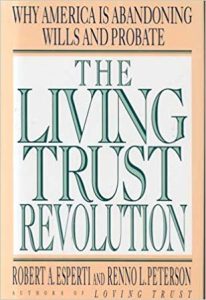The One Inconvenient Truth About the “Living Trust Revolution”
By Phil Rarick & Jacqueline Bowden Gold, Weston Estate Planning Attorneys
In 1992 estate planning attorneys Robert Esperti and Renno Peterson wrote the best selling book, The Living Trust Revolution that captured the major shift in estate planning arising from the $6.8 trillion worth of wealth transfer beginning to take place in the United States. That was 1992. With the baby boom generation now retiring it is estimated that nearly 45 million U.S. households will hand down about $68.4 trillion over the course of the next quarter-decade, according to research firm Cerulli Associates. Note: the estimate of this massive wealth transfer is now ten times the size from 1992!

The living trust revolution correctly foresaw the shift in estate planning from wills, as the cornerstone of estate plans, to living revocable trusts. This revolution has helped many families avoid the cost of probate and keep legal control within the family for managing the wealth transfer. I am convinced it has helped prevent many family disputes and outright family wars that break out when the family patriarch or matriarch dies without a well drafted trust. A well drafted trust lays out clear instructions about the family matriarch’s wishes and intentions. It is when the matriarch leaves “in a vacuum” instructions that she creates an environment for family warfare.
By most accounts, the living trust revolution has been a tremendous benefit to families with modest estates to those with large estates. However, as a trust attorney who has drafted and administered hundreds of trusts for over 20 years there is one inconvenient truth – a downside that is difficult to anticipate. Let’s call it simply the “lay trustee” problem.
Here is an example: Mom, age 61 names her daughters, Olga and Stacey, as successor disability and death co-trustees in her living trust. Stacey was 21 and Olga was 29 at the time the trust was drafted in 2000. At this time Stacey was finishing up her bachelor’s degree at FSU in psychology and an average student. Mother has a $600,000 house with no mortgage and $500,000 in checking and money market accounts. Mother last year had a stroke rendering her unable to mange her financial affairs; therefore, per the trust Stacey and Olga were named acting Co-Trustees. Stacey has a serious Oxycontin addiction, and $100,000 disappears from mom’s money market account before Olga discovers the missing money. Olga confronts Stacey, who immediately confesses to the theft but states she has no money to pay back because she just lost her job. Stacey agrees to resign as Trustee and Olga agrees not to report the theft to the police.
Most grantors of living trusts want to name a family member or friend as a successor Trustee: an adult child, a younger sibling, or trusted friend. In many cases, these persons are fully competent to act as Trustee with some guidance from a trust attorney. However, in some cases, a lay trustee does not work; we have found the situations fall into these categories:
- The lay trustee is qualified, but too busy to properly administer the trust
- The lay trustee is elderly with beginning dementia but is in denial of reduced mental ability
- The daughter or son named trustee is not trusted by the other siblings
- The lay trustee refuses to seek legal advice because she or he is a “do-it-yourself” type of person
- The trustee is a poor money manager or simply has no experience in money management and refuses to retain a Certified Financial Planner
- The trustee is accustomed to receiving financial assistance from the parents and doesn’t know how to separate the trust assets from personal assets
- The beneficiaries are from a blended family and do not get along, no matter the circumstances
- The lay trustee lives out of state or in another country and does not have the ability to constantly travel to properly administer the trust
Solution: Trust Advisor Or Independent Trustee
- Trust Advisor. I have become convinced that many – maybe most – families would benefit from a professional Trust Advisor with authority to advise the Trustee in general but with no fiduciary powers. Of course the Trustee Advisor could be a much stronger Advisor with fiduciary powers, such as: (1) Power to Amend or Revoke Trust; (2) Power to Direct or Restrict Specific Investments; (3) Power to Direct the Exercise of Any Fiduciary Powers; and (4) Power to Direct Change of Trust Situs.
Even if the grantor is confident about the ability of her named Trustees it may be a good idea to ensure that they receive professional counsel by naming an Advisor. This Advisor could be the estate planning attorney or CPA. Note: In Florida, it is advisable to have the client sign a Disclosure and Consent notice if the Advisor is both the attorney who drafted the trust and the named Advisor, see RPC 4-1.7 Florida Rules of Professional Conduct, addressing conflicts of interest.
- Independent Trustee (“IT”). In situations where there is a history of conflict among the siblings or beneficiaries, it may be advisable to name an Independent Trustee to act as Co-Trustee with the Family Trustee. There should be a requirement that the Family Trustee cannot serve alone; that there must always be a professional IT who is either a corporate or non-corporate professional Trustee.
Conclusion
The living trust revolution created a powerful estate planning tool that likely should be the cornerstone of your estate plan. However, to minimize family conflict, it may be prudent to name either a Trust Advisor or Independent Trustee to help ensure that your wishes are fulfilled with a minimum of conflict. For more information, meet with an experienced Weston estate planning attorney.
Call us at (305) 556-5209 or email info@raricklaw.com. Let us know how we can help.
Special Note
The information on this blog is of a general nature and is not intended to answer any individual’s legal questions. Do not rely on information presented herein to address your individual legal concerns. If you have a legal question about your individual facts and circumstances, you should consult an experienced Weston estate planning attorney. Your receipt of information from this website or blog does not create an attorney-client relationship and the legal privileges inherent











